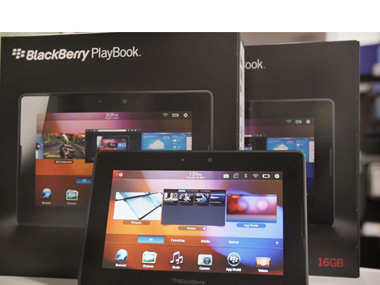Confidence has tanked in Research In Motion (RIM), makers of the BlackBerry and the newly released PlayBook, which made its India debut on Wednesday.
RIM released its new tablet device with great fanfare, but was then forced to almost immediately slash 200 jobs at its Canadian headquarters on Wednesday, and to lower its sales targets for the PlayBook by 50 percent in the second quarter of 2011, from 2.4 million to about 900,000.(Firstpost‘s review of the Playbook in a phrase: Ho-hum.)
This follows on a lacklustre first-quarter earnings report released last week, where it downgraded its 2012 outlook. The mobile company had lost half its value since January 1, and it is now trading at 5.4 times the expected 2012 earnings (shares did rise by 10% amid the layoff announcements).
[caption id=“attachment_29874” align=“alignleft” width=“380” caption=“The newly launched Blackberry Playbook. AFP”]  [/caption]
To add insult to injury, top RIM executives have also recently jumped ship and a popular mobile app maker announced this week that it will no longer support the BlackBerry after June 30.
This has Silicon Valley tech bloggers predicting that the end is nigh for RIM.
Navneet Alang of TECHi said that even though the device remains popular in non-US markets, the “ BlackBerry will never rise again” and RIM’s biggest problem is that it’s simply “playing catchup to their competitors.”
Impact Shorts
More ShortsThe inherent problem with that, Alang wrote, is that “even if RIM can catch up, they’re still too far behind to ever get ahead of their competitors. What magic innovation of both product and ecosystem will allow them to stop the decline of market share?”
Similarly, TechCrunch has pronounced that “Research in Motion is done.”
Here’s why, according to John Biggs:
Blackberries aren’t status symbols. They’re the real-world equivalent of the thick, heavy IT-department-assigned business laptop. They’re staid, boring, and unwanted but people are used to them and, for email, they are quite capable. But that’s about it.
Also, Biggs wrote, RIM is a slave to its own success: “They can’t sell anything other than a keyboard-candybar phone in an era where the keyboard is increasingly irrelevant or hidden away until needed. This failure of imagination in both consumer and manufacturer is their curse. … It’s over and now we’re just waiting for the buy-out and inevitable disappearance of one of the greatest mobile companies in modern memory.”
Not so fast
Reviews and sales of PlayBook have been so-so, but some analysts are less bearish on RIM.
The Wall Street Journal reported on Wednesday that Macquarie Capital analysts Kevin Smithen and Scott Thompson gave RIM an “outperform” rating, and they noted that despite the mobile company’s myriad problems-including delayed product launches, poor reaction to industry trends, and ineffective CEO and Board structure-investors have underestimated RIM’s advantage on the international market.
“We believe that RIM’s international business and its software and services segments have a longer tail than many shareholders expect and that current share prices already imply negative value for the U.S. device and tablet businesses,” Smithen and Thompson wrote.
And certainly, RIM executives believe that the growing Indian market for smartphones can help give the company a bump. As RIM India director of marketing Krishnadeep Baruah told the Hindustan Times, “the smartphone market is growing at 110% in India, which is much much higher than the global growth rate” and that RIM’s market in India in the last two years “has been growing faster than the smartphone growth rate.”
But Bloomberg reported that there is “growing concern that RIM may lose market share in those international markets just as it has done in the US to Apple Inc.’s iPhone and handsets based on Google Inc.’s Android software.”
The view from here
As a former BlackBerry devotee who has made the switch to an Android device, I can say that the BlackBerry is the dumbest of the smartphones. From processing speed, to user interface, to mobile applications, RIM simply hasn’t kept up with the culture or the times.
Sure, BlackBerry still has its following, and it’s particularly popular among email jockeys. The enhanced security is also a plus in the corporate world and in the government sector.But then again, even the US federal government-including some agents of the Department of Homeland Security-is making the switch to iPhones and iPads.
So overall, the signs are not encouraging, and the writing is on the wall. The common wisdom around Silicon Valley seems to be that unless RIM pulls a rabbit out of its hat-and fast-it will soon disappear into the has-been mobile ether.


)

)
)
)
)
)
)
)
)



